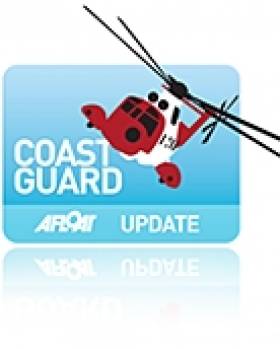Displaying items by tag: Global Maritime Awareness
Missing 'Ghost Ship' Found 2,400km Off Ireland
#GhostShip - The missing 'ghost ship' MV Lyubov Orlova that has been adrift in the North Atlantic since the end of January has finally been located - some 2,400 off the West of Ireland.
US technology site Gizmodo reports on the discovery via the daily memorandum of the US National Geospatial-Intelligence Agency, which creates maps for top-secret military and civilian use.
It's not clear by what means the vessel was detected, as it has no lights and its Automatic Identification System (AIS) is switched off.
But it may be the result of efforts made by marine surveillance expert Guy Thomas, who has been working in collaboration with the Irish Coast Guard on a new system of marine monitoring called Global Maritime Awareness.
As previously reported on Afloat.ie, Thomas was contacted by Irish Coast Guard director Chris Reynolds amid concerns that the MV Lyubov Orlova might suddenly appear in Irish waters and become a burden on the State.
Responsibility for the vessel has already been disavowed by the Canadian authorities after the vessel, which was being towed from Canada to the Caribbean for scrapping, broke loose from its cabling.
Current information on the ghost ship's position indicates that it is being carried by Atlantic currents towards Europe.
Irish Coast Guard Collaborates On New Marine Monitoring System
#Coastguard - The Irish Coast Guard is collaborating on a new system of marine monitoring in the hopes of detecting a dead ship that may threaten to run aground on Ireland's shores.
The Newfoundland Shipping News blog details how the MV Lyubov Orlova, adrift somewhere in the North Atlantic, is being used to test the capabilities of a new system called Global Maritime Awareness.
The system is based on the idea that if the world's top satellite tracking technologies could be banded together, it could establish a much more comprehensive monitoring system for the marine environment.
Marine surveillance expert Guy Thomas, who devised the concept, said he had the idea that if a receiver akin to that used in the Automatic Identification System (AIS) for ship tracking and collision avoidance was put on a satellite in orbit, "you would now have the international identification system for ships that was lacking".
That was done, and a second accompanying system was added that provides radar information from space. The Global Maritime Awareness system combines those with detailed satellite imagery, and Long Range Identification and Tracking {LRIT) technology whereby ships can verify themselves to others and the systems tracking them.
Thomas says these four satellite systems working in tandem make for "a very effective tool in monitoring marine environments for illegal activity".
But it can also be used to prevent potential environmental catastrophes - which is where the MV Lyubov Orlova comes in.
The Irish Coast Guard's director Chris Reynolds contacted Thomas with its concerns that the dead ship might drift into Irish waters and become a burden on the State. Thomas suggested using his system to find it, almost like an ocean-wide version of the game Battleships: even when a ship isn't sending any signals, it can still be tracked, just by looking for ships that aren't transcending through AIS.
Thomas and the Irish Coast Guard are currently working hard at this, crossing off vessels that are communicating through satellite systems till they can narrow it down to the one they're looking for. And they may now have a hit south-southeast of Greenland, although it will be some days before they can confirm.
Newfoundland Shipping News has much more on the story HERE.






























































